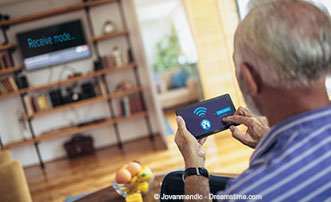Last month, we discussed “low-tech” assistive technology options to help keep people with dementia more independent. This month, we will go over some “high tech” options.
During this time of COVID-19, many people have been forced to adapt to using more technology to connect with others. It’s safe to say that most people these days have access to a smart phone, tablet, or computer. There are some simple, free ways to use technology to connect with others. Programs such as Facebook messenger, Google Meet, and Microsoft Teams all offer free options to video chat with loved ones. Similarly, technology devices like an Alexa Show, Google Nest Hub, or GrandPad make connecting via video much simpler, but know these devices can be costly. Though these programs can help your loved one feel connected, be aware that sometimes video calls can confuse individuals with dementia.
Communication by telephone is what individuals with dementia are likely most familiar with. However, it may become more difficult to remember the phone numbers of loved ones and friends. Dementia can also affect someone’s vision, making it more difficult to see and press small numbers and buttons on the phone. Consider a phone with large-print numbers or a phone that you can program phone numbers of friends and family members and use their photo as the button. If your loved one feels comfortable using a computer, tablet, or smartphone to communicate, there are settings to activate “talk to text” or “text to voice” which could read a message aloud for your loved one or auto-type a message to someone else using the voice of your loved one.
Smart homes are no longer a thing of the future! Technology allows us to use devices to control our televisions, lights, door locks, appliances, and more. The most well-known devices and apps to make this happen are provided by Amazon Alexa and Google Home, but there are many other options out there. These can help caregivers see whether the stove has been left on (and turn it off if it has!), make sure the doors are locked at night, and even turn lights on and off to save electricity.
Similarly, home cameras can sometimes be used to assist caregivers in caring for their loved ones with dementia. A home monitoring system can allow caregivers to “check-in” on their loved ones remotely. Weigh the pros and cons, there are some ethical considerations to think about when installing a camera or monitoring system. Is your loved one still able to maintain autonomy and self-determination? Will the cameras decrease their risk of danger? How will the footage or cameras be used?
For individuals with dementia who may be experiencing agitation, fidgeting, restlessness, or other behavioral symptoms, you could consider using the technology of a robotic pet. You can purchase robotic pets for about $110 online. These “pets” are realistic in size, feel, and sound. Many are programmed to purr, meow, or bark like a dog or cat would. There are some studies that point to benefits for people with dementia related to reduced behavioral symptoms without the use of medication.
Of course, there are so many options to choose from that this process can be overwhelming. Contact ADRC to get more information on agencies in the area that can help sift through assistive technology solutions that work best for you and your loved one.
Source:
National Family Caregiver Alliance
www.caregiver.org/assistive-technology




